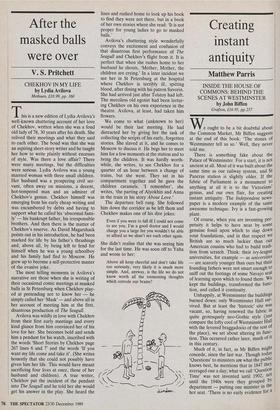After the masked balls were over
V. S. Pritchett
CHEKHOV IN MY LIFE by Lydia Avilova Methuen, £10.99, pp. 160
This is a new edition of Lydia Avilova's well-known chattering account of her love of Chekhov, written when she was a fond old lady of 78, 30 years after his death. She relived their meetings and what they said to each other. The bond was that she was an aspiring short-story writer and he taught her how to write plainly without excesses of style. Was there a love affair? There were many meetings, but the difficulties were serious. Lydia Avilova was a young married woman with three small children. Her husband was a prospering civil ser- vant, often away on missions, a decent, hot-tempered man and an admirer of Chekhov's genius. Chekhov himself was emerging from his early cheap writing and was encumbered by debts and having to support what he called his 'abnormal fami- ly' — his bankrupt father, his irresponsible brothers. And then there is the matter of Chekhov's reserve. As David Magarshack points out in his introduction, he had been marked for life by his father's thrashings and, above all, by being left to fend for himself when he was a young schoolboy and his family had fled to Moscow. He grew up to become a self-protective master of the evasive joke.
The most telling moments in Avilova's narrative are those when she is writing of their occasional comic meetings at masked balls in St Petersburg when Chekhov play- ed at pretending not to know her — he simply called her `Mask' — and above all in her account of meeting him at the first, disastrous production of The Seagull.
Avilova was wildly in love with Chekhov from their first early meetings and every kind glance from him convinced her of his love for her. She becomes bold and sends him a pendant for his watch, inscribed with the words 'Short Stories by Chekhov page 267 lines 6 and 7' and the words `If you want my life come and take it'. (She writes honestly that she could not possibly have given him her life. This would have meant sacrificing four lives at once, those of her husband and children). A true writer, Chekhov put the incident of the pendant into The Seagull and he told her she would get his answer in the play. She heard the lines and rushed home to look up his book to find they were not there, but in a book of her own stories where she read: 'It is not proper for young ladies to go to masked balls.'
Avilova's chattering style wonderfully conveys the excitement and confusion of that disastrous first performance of The Seagull and Chekhov's flight from it. It is perfect that when she rushes home to her husband he shouts, 'Mother, Mother, the children are crying.' In a later incident we see her in St Petersburg at the hospital where Chekhov is terribly ill, spitting blood, after dining with his patron Suvorin. She had arrived just after Tolstoy had left. The merciless old egotist had been lectur- ing Chekhov on his own experience in the theatre. Avilova, at least, had taken him flowers.
We come to what (unknown to her) would be their last meeting. He had distracted her by giving her the task of collecting the scripts of his early, forgotten stories. She slaved at it, and he comes to Moscow to discuss it. He begs her to meet him for a few moments at the station and to bring the children. It was hardly worth- while, she writes, to see Chekhov for a quarter of an hour between a change of trains, but she went. They sat in his compartment together and he gave the children caramels. 'I remember', she writes, 'the parting of Alyokhin and Anna in the train in his story About Love.'
The departure bell rang. She followed him down the corridor as he left them and Chekhov makes one of his dire jokes:
Even if you were to fall ill I could not come to see you. I'm a good doctor and I would charge you a large fee you wouldn't be able to afford so we shan't see each other again.
She didn't realise that she was seeing him for the last time. He was soon off to Yalta and wrote to her:
Above all keep cheerful and don't take life too seriously; very likely it is much more simple. And, anyway, is the life we do not know worth all the tormenting thoughts which corrode our brains?










































































































 Previous page
Previous page